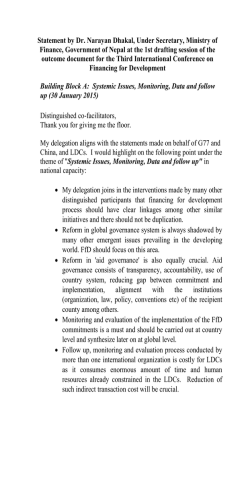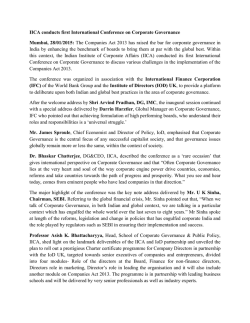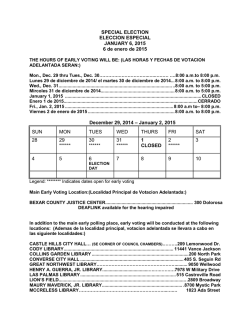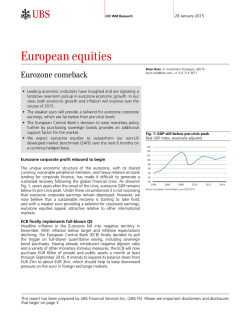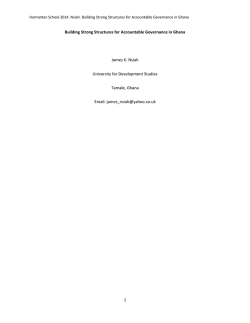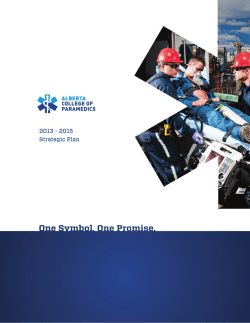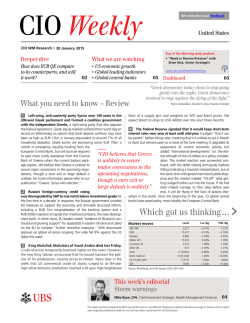
ESG overview
FOR PROFESSIONAL CLIENTS ONLY Environmental, social and governance (ESG) investment policies January 2015 1. Does your organisation have a policy regarding the integration of environmental, social and corporate governance (ESG) issues in investment processes? UBS Global Asset Management is a large scale asset manager, providing traditional, alternative, real estate, infrastructure and private equity investment solutions to private clients, financial intermediaries and institutional investors worldwide. With a number of investment areas and a range of strategies within each area, the approach to ESG issues necessarily varies across the firm and, to some extent, across countries/regions according to local market customs and client needs. The table below summarizes the general approach to environmental and social factors and to corporate governance across each of our investment areas, subject always to any client-specific instructions or restrictions and following any local laws or standards applicable in the domiciles of assets or funds. The answers to the rest of the questions in this document refer (unless otherwise stated) to our Global Corporate Governance Principles and the investment areas to which they apply, as identified in the table. Firm-wide summary of approach to ESG issues Investment area/strategy group Environmental/social/governance factors taken into account?1 Corporate Governance Principles applied?1 Core/Value Equities (excluding SRI strategies) Assessed as part of research and stock selection processes. Engagement with company management (to varying degrees according to local customs/regulations). Exclusion criteria can be applied at client request. Global Corporate Governance Principles apply. Core/Value Equities (SRI strategies of Sustainable Equities team only) Positive and negative screening are key parts of the investment process. Global Corporate Governance Principles apply. SRI investment themes include climate change, water and energy efficiency. In addition, active engagement with company management is undertaken. Growth Investors Assessed as part of research and stock selection processes. Not a primary factor but considered if could have reputational or regulatory impact on a company and thus detrimentally impact its growth prospects. Also look at potential growth prospects of “green” companies. Exclusion criteria can be applied at client request. Global Corporate Governance Principles apply. Structured Beta & Indexing No specific polices, screening can be undertaken at client request. Global Corporate Governance Principles apply. Government bonds Not applicable Not applicable Non-government bonds No specific policies but analysts’ research process includes environmental risk factors. Some tangential benefit from Equities’ engagement with company management. Global Corporate Governance Principles apply (to the extent that voting opportunities arise). Equities Fixed Income Global Investment Solutions (GIS) All GIS strategies To the extent applied to underlying assets managed by UBS Global Asset Management. No specific policies when selecting third party managers. Global Corporate Governance Principles apply to the underlying assets managed by UBS Global Asset Management and to the extent detailed in the rest of this table. Corporate governance policies are evaluated when selecting third party managers. Hedge Funds Single manager (O’Connor) No specific policies. O’Connor Proxy Voting Policy applies. Multi-manager (A&Q) No specific polices (some underlying managers may have policies). No specific polices (underlying managers may have policies). Direct real estate investments Responsible Property Investment policy integrated into the management of investments at property and fund level. Environmental and social due diligence a mandatory part of asset acquisition process. Not applicable Fund of funds Considered as part of investment decision making process. Not applicable Listed real estate securities Assessed as part of research and stock selection processes. Global Corporate Governance Principles apply. Global Real Estate (GRE) Infrastructure and Private Equity Direct infrastructure investments Assessed as part of due diligence in asset acquisition and monitored as part of ongoing asset management. Comprehensive controls over companies invested in to ensure board appointees and managers are complying with relevant regulations and obligations. Multi-manager infrastructure and private equity Assessed as part of due diligence when making investments in underlying funds. No specific policies (underlying managers may have policies). 1 Subject to any client-specific instructions/restrictions and following any local laws or standards applicable in the domiciles of assets or funds 2. Does your organisation have a formal, written policy on proxy voting and engagement, and if so are these policies public? Yes. Please refer to our Global Corporate Governance Principles below. These principles are published on our website and apply to the areas of our business identified in the table in answer 1 above. In addition, we also publish an annual update on our governance and voting activity and ESG engagement. Global Corporate Governance Principles Overview These principles describe the approach of the Equities, Fixed Income and Global Investment Solutions investment areas of UBS Global Asset Management to corporate governance and to the exercise of voting rights on behalf of its clients (which include funds, individuals, pension schemes and all other advisory clients). They also apply to the listed real estate securities held within the Global Real Estate investment area. Where clients of UBS Global Asset Management have delegated the discretion to exercise the voting rights for shares they beneficially own, UBS Global Asset Management has a fiduciary duty to vote shares in the clients’ best interest. These principles set forth UBS Global Asset Management’s approach to corporate governance and to the exercise of voting rights when clients have delegated their voting rights to us. Key principles UBS Global Asset Management’s global corporate governance principles reflect our active investment style and structure that provides us with detailed knowledge of the investments we make on behalf of our clients. With that detailed knowledge, we always seek to judge what is in the best interests of our clients as beneficial owners of those investments. We believe voting rights have economic value and should be treated accordingly. Where we have been given the discretion to vote on behalf of our clients, we will exercise our delegated fiduciary responsibility by voting in a manner we believe will most favorably impact the economic value of their investments. Good corporate governance should, in the long term, lead towards both better corporate performance and improved shareholder value. Thus, we expect board members of companies in which we have invested to act in the service of the shareholders, view themselves as stewards of the company, exercise good judgment and practice diligent oversight of the management of the company. A commitment to acting in as transparent a manner as possible is fundamental to good governance. In serving the interests of our clients, some capabilities within UBS Global Asset Management may at times pursue differing approaches towards particular corporate governance issues, including how to vote or abstain on proposals. This reflects the diverse nature of our capabilities. However, in all cases the interests of clients will be paramount. Underlying our voting and corporate governance principles we have two fundamental objectives: We seek to act in the best financial interests of our clients to enhance the long-term value of their investments. As an investment advisor, we have a strong commercial interest that companies in which we invest on behalf of our clients are successful. We promote best practice in the boardroom. To achieve these objectives, we have established a set of principles to guide our exercise of voting rights and the taking of other appropriate actions, and to support and encourage sound corporate governance practice. These principles are applied globally but also permit individual regions or countries within UBS Global AM the discretion to reflect local laws or standards where appropriate. While there is no absolute set of standards that determine appropriate governance under all circumstances and no set of values will guarantee ethical board behaviour, there are certain principles which provide evidence of good corporate governance. We will, therefore, generally exercise voting rights on behalf of clients in accordance with the following principles. Board Structure Significant factors for an effective board structure include the following: An effective Chairman is key The roles of Chairman and Chief Executive generally should be separated The Board should be comprised of individuals with appropriate and diverse experience capable of providing good judgment and diligent oversight of the management of the company The non-executive directors should provide a challenging but generally supportive environment for the executive directors Board Responsibilities For effective discharge of board responsibilities: The whole board should be fully involved in endorsing strategy and in all major strategic decisions (e.g., mergers and acquisitions) The Board should ensure that at all times: – appropriate management succession plans are in place – the interests of executives and shareholders are aligned – the financial audit is independent and accurate – the brand and reputation of the company is protected and enhanced – a constructive dialogue with shareholders is encouraged – it receives all the information necessary to hold management to account Areas of Focus Areas of concern related to our corporate governance focus include the following: Economic value resulting from acquisitions or disposals Operational performance Quality of management Independent non executive directors not holding executive management to account Quality of internal controls Lack of transparency Inadequate succession planning Poor approach to corporate social responsibility Inefficient management structure Corporate activity designed to frustrate the ability of shareholders to hold the board to account or realise the maximum value of their investment 3. How many times did your organisation vote over the last year (please indicate which year) across all regions and what percentage was for management/against management/abstentions? We vote globally so long as there is no conflict with the efficient management of client portfolios. In the year to 31 December 2014 we voted at 7,325 company meetings globally on a total of 74,655 separate resolutions. The meetings we voted at breakdown by region as shown in the table. We declined to support management on 5,246 or some 7% of these resolutions. Voting history by region – year to 31 December 2014 Region Number of shareholder meetings voted Total resolutions voted Number of votes with management 1,239 10,340 9,248 1,092 0 Australasia 381 1,994 1,814 180 6 Japan 803 8,801 8,151 650 0 1,097 13,453 11,722 1,731 3 887 12,021 11,756 265 10 2,410 22,405 21,506 899 1 Other 508 5,641 5,212 429 3 Total 7,325 74,655 69,409 5,246 23 Asia Pacific (exAustralasia and Japan) Europe (ex-UK) UK North America Number of votes against management Number of abstentions Source: UBS Global Asset Management 4. Does your organisation evaluate and report on the outcomes of voting? We maintain a comprehensive database of our governance engagements, votes cast and the reasons for voting against management or abstaining. We report to clients on how we have voted on their behalf. We publish annual reviews of our engagement activity in certain markets. Details of all our votes at UK meetings, as well as the voting record for shares held in our US, Canadian and Australian mutual funds, are published on our website. 5. What additional resources (if any) are used to implement your voting and engagement activities (e.g. practical tools and procedures for the analysis of resolutions, voting procedure, etc)? In order for UBS Global Asset Management to fulfil its obligations as a responsible shareholder and meet the standards outlined in our Global Corporate Governance Principles document, it is essential that we have access to accurate information regarding companies in which we invest, including the approach to corporate governance adopted by the company. Taking into account the number of companies in which we invest across global markets, we consider it efficient to retain the services of a specialist provider experienced in obtaining information regarding shareholder meetings held by listed companies. Such providers are able to supply the agenda of meetings and the current and historical background to each item to be voted upon. For this reason ISS Governance Services (ISS) has been selected to provide this service. ISS offers global coverage on the securities held by UBS Global Asset Management, has a secure internet-based platform for providing information and research and is able to manage customized client requirements. Proxy voting instructions UBS Global Asset Management does not allow ISS to make unilateral voting decisions on behalf of our clients or our mutual funds. Whilst ISS is our appointed research agent and provides recommendations upon how to vote based upon UBS Global Asset Management or client policy, we determine the final voting instruction for each agenda item at each meeting. The only exception to this is where a client has given specific direction on how we are to vote on their behalf, in which case we retain ISS to manage specific requirements. Given the level of meetings held and voted upon annually, the number of clients for whom we are appointed as discretionary investment manager with voting rights, and the amount of custodians globally that we have to work with, it is appropriate to use a vendor to collate our instructions and act as a “middle-man” between UBS Global Asset Management and custodians and issuers. As ISS provide the research on company meetings it is economic and efficient to use ISS as vendor to manage our instructions through the various parties involved in the voting process. This provides us with an end to end solution for research and voting, and enables us to have a central hub for managing all votes globally, as ISS can provide different time zone coverage for global securities as well as account officers in London, where our Corporate Governance team is based. 6. Who within your organisation is involved in implementing your responsible investment policy? (This includes ESG research, voting and engagement activities). Please include names of individuals, position, areas of expertise, regions covered and number of years relevant experience. UBS Global Asset Management established an ESG Forum in January 2010. The forum meets quarterly and is co-chaired by UBS Global Asset Management's Chief Operating Officer and Head of Governance and Stewardship. The membership of the forum comprises representatives from each of our main investment capabilities, and representatives from key client servicing regions. The aims of the forum are to: - Promote best practice and ESG developments - Oversee objectives, measurement and reporting related to ESG - Ensure awareness/communication between different areas of UBS Global Asset Management - Oversee internal and external communication of Global AM's ESG practices and progress Governance and voting Within our Equities investment area, we have a team dedicated to Governance, Stewardship and voting. Ian Pitfield, Head of Governance and Stewardship, is responsible for setting and implementing UBS Global Asset Management's corporate governance and responsible investment policy, working closely with the investment teams. Ian has wide investment experience both as an analyst and portfolio manager, and has worked at UBS Global Asset Management since 1986. Ian leads our global voting team and the engagement on corporate governance with the companies in which UBS Global Asset Management invests on behalf of clients. The Governance and Stewardship team is responsible for voting for all clients globally in all worldwide markets. The only exception to this will be locations where legal restrictions prevent us from either voting for clients, or do not allow voting powers to be exercised outside the local jurisdiction. This approach has enabled us to ensure that our corporate governance and voting service is integrated and closely aligned with our investment teams and ensures that we have a consistent, robust process when acting for our clients. Sustainable Equities team Also within our Equities investment area, we have a dedicated Sustainable Equities portfolio management team of three investment professionals, headed by Bruno Bertocci, who has over 30 years of equity investing experience. The team's investment process combines bottom-up fundamental research with rigorous sustainability analysis. We actively look for companies that appear attractively valued and can benefit from secular themes, such as energy and water conservation, health care, demographics and other long-term trends. The Sustainable Equities team leverages Global Asset Management's wider Equities analyst platform including global sector specialists and regional small and mid-cap specialists. 7. Is your organisation a member or signatory to any collaborative networks, initiatives or associations that relate to active ownership or ESG issues, including the United Nations Principles for Responsible Investment (UNPRI)? UBS Global Asset Management became a signatory to the Principles for Responsible Investment (PRI) in April 2009. This is a global investor initiative that is designed to provide a framework for better integration of ESG issues into mainstream investment practice. We are also one of the original signatories in 2002 of the Carbon Disclosure Project, a member of the International Corporate Governance Network (ICGN) and a signatory to the Extractive Industries Transparency Initiative (EITI). Further, our specialist Sustainable Equities team participates in international working groups including UN Global Compact Report: Who cares wins, the Global Initiative for Sustainability Ratings and the Sustainability Accounting Standards Board (SASB). We work with collective bodies, such as the ABI Investment Committee, or collaborate with other major shareholder groups if we believe this will increase the chance of engagement success. We are also a member of the Conference Board's Council on Corporate Governance, which brings together asset managers and companies for constructive debate. Our real estate investment area is a member of the US Green Building Council, the UNEP FI Property Working Group, and MINERGIE, a leading Swiss sustainability organization. In July 2010 the UK Stewardship Code was published with the aim of “enhancing the quality of engagement between institutional investors and companies to help improve long-term returns to shareholders and the effective exercise of governance responsibilities”. We are strongly supportive of the Stewardship Code. We pride ourselves on putting clients at the heart of everything we do and it is clearly in their best interests for us to exercise our stewardship responsibilities 8. To what extent, if any, has your organisation asked brokers or investment research providers to adapt their services to include ESG issues? We rank the brokers we use on a number of criteria including the quality of their research on ESG issues. In addition we subscribe to the research provided by MSCI ESG Research MSCI ESG Research provides in-depth research, ratings and analysis of the environmental, social and governance-related business practices of thousands of companies worldwide. The MSCI ESG Research team consists of more than 150 specialists worldwide, including more than 90 dedicated ESG analysts and researchers. This document summarizes UBS Global Asset Management’s general approach to environmental, social and governance issues. Individual investment areas, regions or countries within UBS Global Asset Management have the discretion to reflect local laws or standards where appropriate. This document is intended for limited distribution to clients and associates of UBS Global Asset Management. Use or distribution by any other person is prohibited. Copying any part of this publication without the written permission of UBS Global Asset Management is prohibited. Published January 2015.
© Copyright 2026
